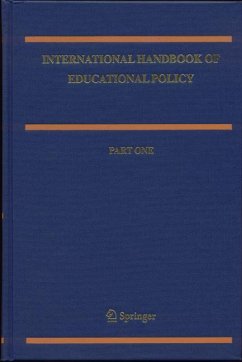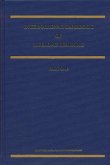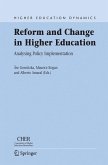This Handbook is for policy researchers, analysts, academics and graduate students interested in educational policy, educational reform, educational governance and leadership, teacher quality, literacy, and workplace learning.
This Handbook is the only one of its kind. It has over fifty chapters written by nearly ninety leading researchers from a number of countries and presents contemporary and emergent trends in educational policy research. It captures many of the current dominant educational policy foci, situating current understandings historically, in terms of both how they are conceptualized and in terms of past policy practice. The chapters are empirically grounded, providing illustrations of the conceptual implications contained within them as well as allowing for comparisons across them. The self-reflexivity within chapters with respect to jurisdictional particularities and contrasts allows readers to consider not only a range of approaches to policy analysis but also the ways in which policies and policy ideas play out in different times and places. Sections cover the contemporary strategic emphasis on large-scale reform; substantive emphases at several levels on leadership and governance, improving teacher quality and conceptualizing learning in various domains around the notion of literacies and concluding, finally, with a contrasting topic, workplace learning, which has had less policy attention and thus allows readers to consider both the advantages and disadvantages of learning and teaching under the bright gaze of policy.
Hinweis: Dieser Artikel kann nur an eine deutsche Lieferadresse ausgeliefert werden.
This Handbook is the only one of its kind. It has over fifty chapters written by nearly ninety leading researchers from a number of countries and presents contemporary and emergent trends in educational policy research. It captures many of the current dominant educational policy foci, situating current understandings historically, in terms of both how they are conceptualized and in terms of past policy practice. The chapters are empirically grounded, providing illustrations of the conceptual implications contained within them as well as allowing for comparisons across them. The self-reflexivity within chapters with respect to jurisdictional particularities and contrasts allows readers to consider not only a range of approaches to policy analysis but also the ways in which policies and policy ideas play out in different times and places. Sections cover the contemporary strategic emphasis on large-scale reform; substantive emphases at several levels on leadership and governance, improving teacher quality and conceptualizing learning in various domains around the notion of literacies and concluding, finally, with a contrasting topic, workplace learning, which has had less policy attention and thus allows readers to consider both the advantages and disadvantages of learning and teaching under the bright gaze of policy.
Hinweis: Dieser Artikel kann nur an eine deutsche Lieferadresse ausgeliefert werden.








